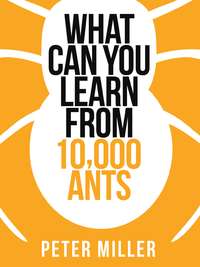Kitap dosya olarak indirilemez ancak uygulamamız üzerinden veya online olarak web sitemizden okunabilir.
Kitabı oku: «What You Can Learn From 10,000 Ants»


Copyright
What You Can Learn From 10,000 Ants contains material first published in Smart Swarm by Peter Miller, first published in 2010 by Collins, an imprint of HarperCollinsPublishers Ltd.
HarperCollinsPublishers Ltd. 1 London Bridge Street London SE1 9GF www.harpercollins.co.uk
Text © Peter Miller 2012
Illustrations © HarperCollinsPublishers; Shutterstock.com
Peter Miller asserts his moral right to be identified as the author of his work
A catalogue record for this book is available from the British Library
All rights reserved under International and Pan-American Copyright Conventions. By payment of the required fees, you have been granted the non-exclusive, non-transferable right to access and read the text of this e-book on-screen. No part of this text may be reproduced, transmitted, down-loaded, decompiled, reverse engineered, or stored in or introduced into any information storage and retrieval system, in any form or by any means, whether electronic or mechanical, now known or hereinafter invented, without the express written permission of HarperCollins e-books
Hardback ISBN: 9780007279906
Collins Shorts ebook edition © NOVEMBER 2012
ISBN: 9780007506859
Version 2018-07-13
Contents
Title Page Introduction What do ants and airlines have in common? Will there be enough food? How many workers will the hive need? How will the weather affect the herd? How do they do it? Ants aren't smart — ant colonies are About the Publisher

Not long ago Southwest Airlines was wrestling with a difficult question: Should it abandon its long-standing policy of open seating on planes? Of all the major airlines, Southwest was the only one that let passengers choose where to sit once they got on board. The airline had done it that way for more than thirty-four years, and it took pride in being an industry maverick. The company’s independent attitude had helped make it one of the largest airlines in the world. Southwest, remember, was the first carrier to encourage flight attendants to tell jokes in the air.
The question turned out to be more complicated than it seemed. For one thing, no one knew how assigned seating would affect the amount of time it would take for Southwest to board everybody. If assigned seating made the process faster, then switching made sense, of course. But if it slowed things down, it wouldn’t help.
To a Southwest analyst named Doug Lawson, the answer seemed obvious: the best way to determine whether assigned seating would be faster was to create a computer simulation of passengers boarding a plane, and then try out one pattern after the other. Other airlines had done more or less the same thing over the years. But Lawson’s plan had a difference—it was based on the behavior of ants.

Why was an ant-based simulation a good idea for Southwest? What do ants and airlines have in common? The answer has to do with the remarkable phenomenon I call a smart swarm. Simply put, a smart swarm is a group of individuals who respond to one another and to their environment in ways that give them the power, as a group, to cope with uncertainty, complexity, and change.
The fact is, ants and other creatures have been dealing with the most difficult kinds of problems for millions of years: Will there be enough food for the colony this week?

Where will it be found? How many workers will the hive need to build a nest?

How will the weather affect the herd’s migration this year?

The way they’ve responded to these challenges has been to evolve a special form of group behavior that is flexible, adaptive, and reliable.
•••••
Just off Route 533 in southwestern New Mexico, a barbed-wire fence surrounds sixty acres of what used to be a sprawling cattle ranch at the foot of the Chiricahua Mountains. For more than two decades now biologist Deborah Gordon, of Stanford University, has documented the life histories of several hundred colonies of red harvester ants that live here.
Ücretsiz ön izlemeyi tamamladınız.
